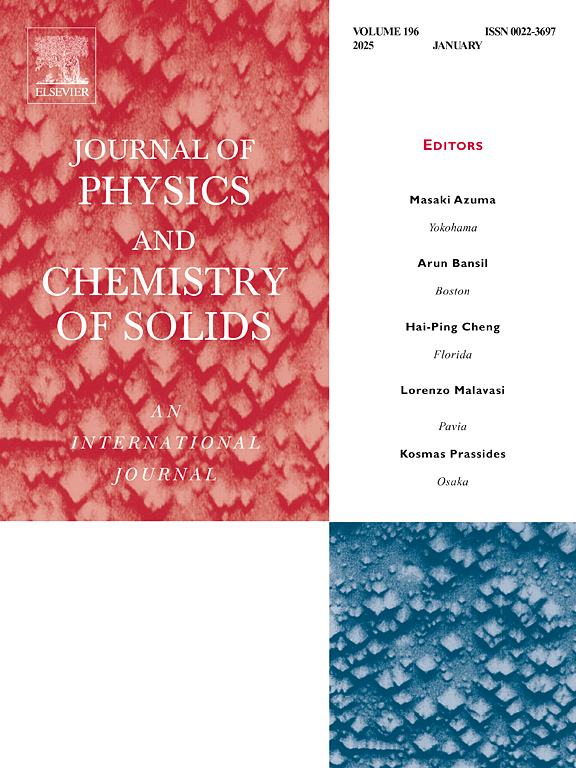Diamagnetic susceptibility and binding energy of hydrogenic impurity in CdSe nanoplatelets: Effect of dielectric mismatch and size-quantization
IF 4.9
3区 材料科学
Q2 CHEMISTRY, MULTIDISCIPLINARY
引用次数: 0
Abstract
This study examines the binding energy and diamagnetic susceptibility of a hydrogen-like donor impurity in colloidal nanoplatelets, taking into account polarization effects arising from the dielectric mismatch between the nanoplatelet and its surrounding medium. The adiabatic approximation and numerical methods are employed to solve the Schrödinger equation. The influence of impurity position, number of atomic monolayers, and environmental permittivity on impurity states is analyzed. The results reveal a non-monotonic dependence of the donor binding energy on impurity position and a strong sensitivity of the diamagnetic susceptibility to nanoplatelet thickness and dielectric mismatch. The behavior aligns with recent experimental trends observed for excitonic states in colloidal CdSe nanoplatelets. These insights provide valuable design guidelines for dielectric engineering and impurity control in optoelectronic applications.
CdSe纳米片中氢杂质的抗磁化率和结合能:介电失配和尺寸量化的影响
本研究考察了胶体CdSe纳米片中类氢供体杂质的结合能和抗磁化率,并考虑了纳米片与其周围介质之间介电失配引起的极化效应。采用绝热近似法和数值方法求解Schrödinger方程。分析了杂质位置、原子单层数和环境介电常数对杂质态的影响。结果表明,供体结合能对杂质位置有非单调的依赖性,抗磁化率对纳米血小板厚度和介电失配有很强的敏感性。这种行为与最近在胶体CdSe纳米血小板中观察到的激子态的实验趋势一致。这些见解为光电应用中的介电工程和杂质控制提供了有价值的设计指南。
本文章由计算机程序翻译,如有差异,请以英文原文为准。
求助全文
约1分钟内获得全文
求助全文
来源期刊
CiteScore
7.80
自引率
2.50%
发文量
605
审稿时长
40 days
期刊介绍:
The Journal of Physics and Chemistry of Solids is a well-established international medium for publication of archival research in condensed matter and materials sciences. Areas of interest broadly include experimental and theoretical research on electronic, magnetic, spectroscopic and structural properties as well as the statistical mechanics and thermodynamics of materials. The focus is on gaining physical and chemical insight into the properties and potential applications of condensed matter systems.
Within the broad scope of the journal, beyond regular contributions, the editors have identified submissions in the following areas of physics and chemistry of solids to be of special current interest to the journal:
Low-dimensional systems
Exotic states of quantum electron matter including topological phases
Energy conversion and storage
Interfaces, nanoparticles and catalysts.

 求助内容:
求助内容: 应助结果提醒方式:
应助结果提醒方式:


